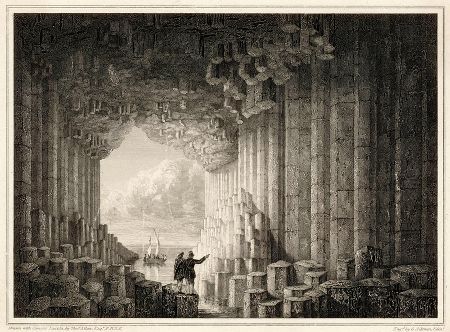Annotation:Fingal's Cave (2): Difference between revisions
No edit summary |
No edit summary |
||
| Line 1: | Line 1: | ||
{{TuneAnnotation | {{TuneAnnotation | ||
|f_annotation='[[File:Fingalscave.jpg|right| | |f_annotation='[[File:Fingalscave.jpg|right|450px|thumb|Fingal's Cave, Staffa, Date 19th century.]]''FINGAL'S CAVE [2]''' (Gul Fhin). AKA and see "[[Cuilfhionn]]," "[[Fingal's Weeping]]." Scottish, Canadian; Air or March (2/4 time, slow). Canada, Cape Breton. A Dorian. Standard tuning (fiddle). AAB (Kerr, Lerwick, Martin): AB'B' (Morison). A popular Highland pipe tune that has been set variously as a hornpipe, march, quickstep,and slow air, though perhaps most popular in its march setting. Fingal, or Fionn Mac Cumhaill [https://en.wikipedia.org/wiki/Fionn_mac_Cumhaill], is a mythic Scottish and Irish hero, who, like King Arthur, is said not to be dead at all, rather, he sleeps in a cave, surrounded by his followers the Fianna. One day he will awake and defend Ireland in the hour of her greatest need. In 1762 writer James MacPherson published his 'translated' six volume poem of Fingal by his son Ossian, although he failed to substantiate his claim that he used original texts. Despite criticism, his work was hugely popular and helped to usher in the romantic era in Europe. | ||
<br> | <br> | ||
<br> | <br> | ||
Revision as of 18:04, 12 May 2022
X:1 T:Guil Fhinn T:Fingal's weeping M:2/4 L:1/8 R:March B:William Gunn - The Caledonian Repository of Music B:Adapted for the Bagpipes (Glasgow, 1848, p. 94) Z:AK/Fiddler’s Companion K:Ador e|A2 B/A/G/A/|BA Ae/d/|BA/G/ ed/B/|d>G G>B| A2 B/A/G/A/|BA Ae/d/|BA/G/ ed/B/|eA A:| B/d/|ed/e/ gf/g/|ae/a/ ge/a/|ed/e/ ge/a/|e/d/B/A/ GB/d/| ed/e/ gf/g/|ae/a/ ge/a/|ge/a/ g/e/d/B/|eA AB/d/| e/d/e/ gf/g/|ae/a/ ge/a/|ed/e/ ge/a/|e/d/B/A/ GA/B/| dc/d/ ed/e/|gf/g/ ae/a/|ge/a/ g/e/d/B/|eA A||

wikipedia:Fingal's_Cave is the romantic name for a sea cave on the uninhabited island of Staffa, in the Inner Hebrides of Scotland.
Neil Munro published a popular poem entitled "Fingal's Weeping" in 1917 in the periodical Blackwood's Magazine The first stanza begins:
Because they were so brave and young
Who now are sleeping,
His old heart wrung, his harp unstrung,
Fingal's a-weeping.

